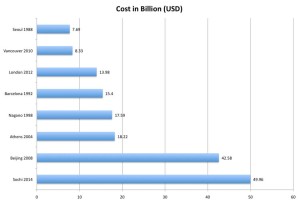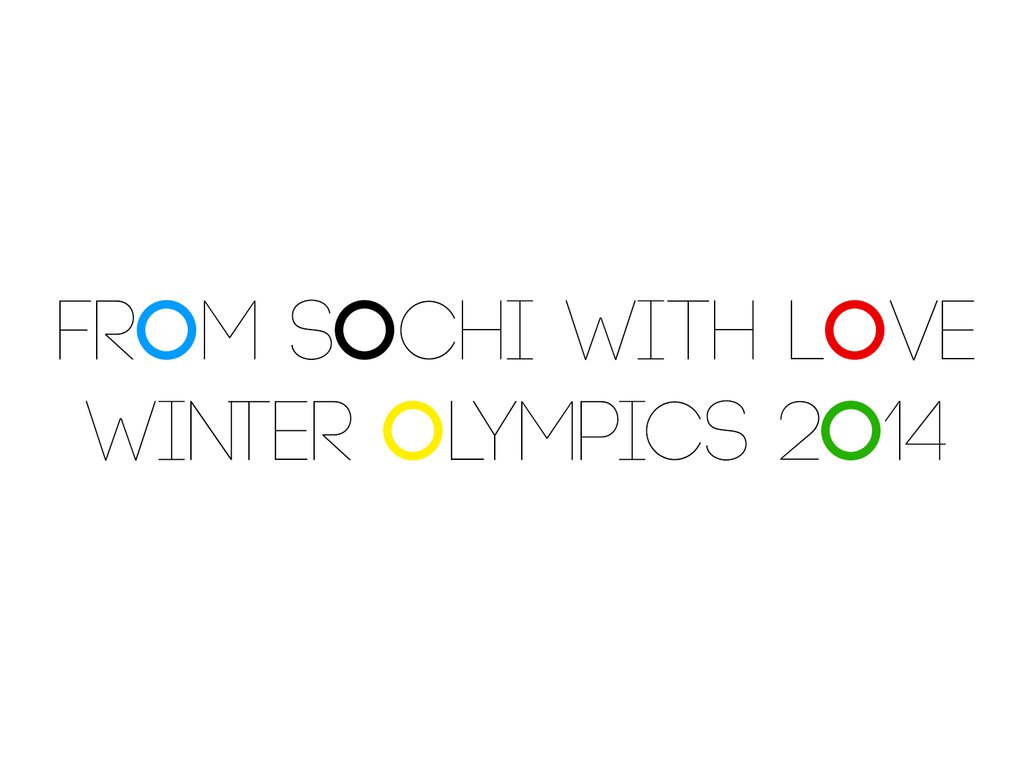By Nikolay Shiderov
UCR Class of 2015
Because the Winter Olympics are only held every four years, it is understandable that there has been much excitement and anticipation leading up to the event. The location, Sochi, Russia has been the focus of much discussion. The Russian city is a beach resort off the coast of the Black Sea and close to the country Georgia. The seventeen-day-long Olympics are going to be filled with spirited competition, as well as disappointment, as inevitably most competitors do not win a medal. Although meticulous thought has been put into the preparation of the event, it is still undetermined whether the event itself will be a disappointment, or even worse live in infamy.
it is understandable that there has been much excitement and anticipation leading up to the event. The location, Sochi, Russia has been the focus of much discussion. The Russian city is a beach resort off the coast of the Black Sea and close to the country Georgia. The seventeen-day-long Olympics are going to be filled with spirited competition, as well as disappointment, as inevitably most competitors do not win a medal. Although meticulous thought has been put into the preparation of the event, it is still undetermined whether the event itself will be a disappointment, or even worse live in infamy.
Why is Sochi subject to such speculation? The Russian “southern capital” was selected in 2007 to be the host of the 2014 Olympics, so naturally commentary has become more frequent and heated as the date draws near. In line with their role as an Olympic host, Russia was already being scrutinized for their anti-gay laws. As soon as the anti-gay law made news, the news outlets started questioning whether the law was appropriate, in light of the grand event to take place in Sochi the following year. Several countries took a stance on the matter, mainly questioning the safety of their athletes and to what extent the law would be enforced in regard to openly gay athletes.
Germany, one of the countries that have emphatically disapproved of Russia’s new law, presented its Olympic uniform in October, which strongly resembled the rainbow of the LGBT movement. Although the designer has maintained the uniform does not have an underlying political message, political statements have been made on the matter. On December 8th, German president Joachim Gauck became the first major political figure to boycott the Olympics, stating that the human rights violations and the “deficit of rule of law” are the reasons for his decision.
Ten days later, on December 18th, U.S. President Barack Obama joined the boycott of the Olympics and announced that the US delegation would include two openly gay sportswomen. Yet, not everyone feels the Olympic are the most suitable forum for political discourse. An Italian member of the International Olympic Committee, Mario Piscante, condemned the actions of the U.S. president, accusing him of mixing sports with politics, namely because being gay in America is an established freedom despite the lack of recognition for this right in Russia. Furthermore, Piscante disagrees with the aforementioned individuals on the efficacy of the boycott, maintaining that the best way to “combat” such issues is to let the events unfold while having thousands of journalists reporting on what is going on.
Although the LGBT controversy has received the lion’s share of media coverage, an even more troubling and problematic issue continues to face Russia, namely corruption. This aspect of Russian society is common across most of Central and Eastern Europe. Statistics on corrupt practices taken in preparing for the Olympics have been present since May of 2013. The fact that the financial scandals have only gained traction three weeks prior to the start of the games is significant, as the entire venue construction process has been colored with troubling practices. This is not to say that government dysfunction should take priority over the discussion of human rights violations.
Back in 2007, when Sochi was selected as the host, the budget wa s estimated to be US $12 billion. In the context of the Olympics, it is normal for the expected amount to fall far below the actual cost. Despite the tendency to go over, in a January 2014 interview President Putin claimed that the costs in Sochi did not exceed US$ 7 billion (214 billion rubles). Other sources have claimed that the cost far exceeds the stated amount. Opposition figures Boris Nemtsov and Leonid Martynyuk have made the stunning claim that the actual price of the Sochi Olympics is nearly US $50 billion. Of those 50, they claim that nearly US $30 billion have been stolen, in the form of patronage. Coveted construction contracts have been granted to good friends of Vladimir Putin, where the cost far exceeds the value of the work. To compare the cost of the Olympics in Sochi with prior Olympics, the cost of building a road and railway between Sochi and Krasnaya Polyana (where skiing events will be held) are larger than the cost in Vancouver in 2010, which only cost US$ 8-9 billion.
s estimated to be US $12 billion. In the context of the Olympics, it is normal for the expected amount to fall far below the actual cost. Despite the tendency to go over, in a January 2014 interview President Putin claimed that the costs in Sochi did not exceed US$ 7 billion (214 billion rubles). Other sources have claimed that the cost far exceeds the stated amount. Opposition figures Boris Nemtsov and Leonid Martynyuk have made the stunning claim that the actual price of the Sochi Olympics is nearly US $50 billion. Of those 50, they claim that nearly US $30 billion have been stolen, in the form of patronage. Coveted construction contracts have been granted to good friends of Vladimir Putin, where the cost far exceeds the value of the work. To compare the cost of the Olympics in Sochi with prior Olympics, the cost of building a road and railway between Sochi and Krasnaya Polyana (where skiing events will be held) are larger than the cost in Vancouver in 2010, which only cost US$ 8-9 billion.
Although Russia has had many public relations problems leading up to the Olympics, the event is not a predetermined disaster. Many news outlets are predicting terror attacks, yet much thought has been put into the security details. Despite the corruption surrounding the event, it is still possible the event can go smoothly, in that the athletes and spectators are safe and are sufficiently accommodated. Outside of fulfilling their obligation as a host city, Russia does not need to fulfill any other standard to be successful, as the Olympics are merely a sporting event and not a political forum.
Nikolay Shiderov, Class of 2015, is a Politics and Sociology major from Dimitrovgrad, Bulgaria.

